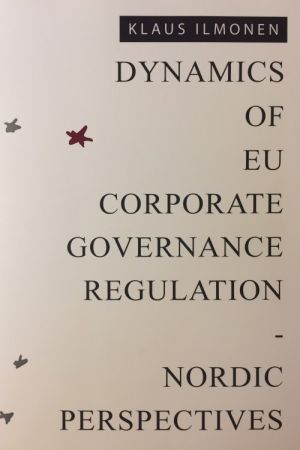Dynamics of EU Corporate Governance Regulation - Nordic Perspectives
The significance of EU level corporate governance regulation has been increasing in the years following the financial crisis. At the same time EU regulatory initiatives in this field have been subject to much criticism. The corporate governance systems in the EU vary significantly and it has been argued that EU initiatives have not been adapted to corporate environments prevalent in member states. This has been argued to have decreased the competitiveness of listed companies and the financial markets in the EU. Several EU corporate governance initiatives have also failed or been subject to considerable political compromise emphasizing the challenging political nature of the EU regulatory system. EU integration represents a model for coordinating interaction between different economies and political systems. Understanding how supranational systems work and developing regulation at this level remains an important venture. More attention is needed to adapt the design of EU regulation to the varied institutional environment across the EU. To be able to develop EU legal strategies and regulatory design in the field of corporate governance, a better understanding of the dynamics of EU policymaking remains important. The goal of the study is to provide a basis for developing legal strategies used in EU corporate governance regulation in light of the challenges of the (i) varied regulatory requirements of different corporate environments in the EU and (ii) the supranational political dynamics of corporate governance regulation. This requires a better awareness of the factors that affect (i) the impact and effectiveness of different legal strategies and regulatory mechanisms in different corporate environments and (ii) the political dynamics of EU policy-making with respect to corporate governance regulation. The study analyses corporate governance regulation in the context of specific environments of corporate governance and corporate ownership. With an emphasis on institutional and political aspects of corporate governance, the study analyses and compares the effects of different legal strategies in these environments; i.e. what the effects of different regulatory mechanisms have been on the relationships between corporate constituencies. The study focuses on corporate governance regulation in the context of concentrated ownership in a Nordic institutional environment. The study also analyses the political dynamics of EU policymaking based on economic theories of regulation and an institutional analysis of EU policy-making. The results of study include a framework for a corporate governance index that incorporates the prevalent institutional dynamic, as well as a qualitative model for developing regulatory policy at the EU level. The study relates to comparative corporate governance research and to political economy analysis of EU regulation.
Dynamics of EU Corporate Governance Regulation - Nordic Perspectives
The significance of EU level corporate governance regulation has been increasing in the years following the financial crisis. At the same time EU regulatory initiatives in this field have been subject to much criticism. The corporate governance systems in the EU vary significantly and it has been argued that EU initiatives have not been adapted to corporate environments prevalent in member states. This has been argued to have decreased the competitiveness of listed companies and the financial markets in the EU. Several EU corporate governance initiatives have also failed or been subject to considerable political compromise emphasizing the challenging political nature of the EU regulatory system. EU integration represents a model for coordinating interaction between different economies and political systems. Understanding how supranational systems work and developing regulation at this level remains an important venture. More attention is needed to adapt the design of EU regulation to the varied institutional environment across the EU. To be able to develop EU legal strategies and regulatory design in the field of corporate governance, a better understanding of the dynamics of EU policymaking remains important. The goal of the study is to provide a basis for developing legal strategies used in EU corporate governance regulation in light of the challenges of the (i) varied regulatory requirements of different corporate environments in the EU and (ii) the supranational political dynamics of corporate governance regulation. This requires a better awareness of the factors that affect (i) the impact and effectiveness of different legal strategies and regulatory mechanisms in different corporate environments and (ii) the political dynamics of EU policy-making with respect to corporate governance regulation. The study analyses corporate governance regulation in the context of specific environments of corporate governance and corporate ownership. With an emphasis on institutional and political aspects of corporate governance, the study analyses and compares the effects of different legal strategies in these environments; i.e. what the effects of different regulatory mechanisms have been on the relationships between corporate constituencies. The study focuses on corporate governance regulation in the context of concentrated ownership in a Nordic institutional environment. The study also analyses the political dynamics of EU policymaking based on economic theories of regulation and an institutional analysis of EU policy-making. The results of study include a framework for a corporate governance index that incorporates the prevalent institutional dynamic, as well as a qualitative model for developing regulatory policy at the EU level. The study relates to comparative corporate governance research and to political economy analysis of EU regulation.













